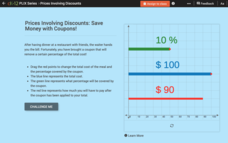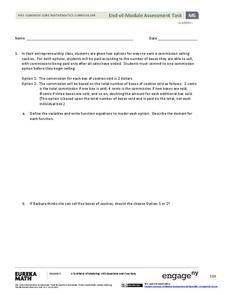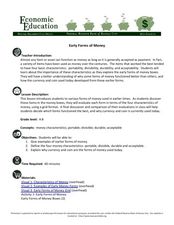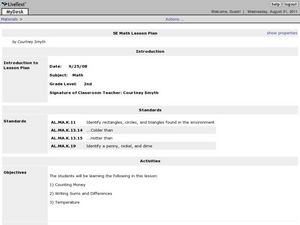EngageNY
More Examples of Functions
Discrete or not discrete? Individuals learn about the difference between discrete and non-discrete functions in the fourth installment of a 12-part module. They classify some examples of functions as being either discrete or non-discrete.
Carstens Studios
Math Doodles
Discover the joy and excitement of improving your math fluency through four different puzzles. Combine those with 25 different ways to represent numbers and you have hours of enjoyment that can be fun outside of the classroom as well.
EngageNY
Piecewise and Step Functions in Context
Looking for an application for step functions? This activity uses real data to examine piecewise step functions. Groups create a list of data from varying scenarios and create a model to use to make recommendations to increase...
CK-12 Foundation
Even and Odd Functions and Function Symmetry: Even and Odd Functions (Symmetry)
Even money states that the resource is good to use. Scholars manipulate an interactive to adjust the portion of a graph to the left of the y-axis. The interactive allows them to switch between even and odd modes that show the right side...
Curated OER
Making Money and Spreading the Flu!
Paper folding, flu spreading in a school, bacteria growth, and continuously compounded interest all provide excellent models to study exponential functions. This is a comprehensive resource that looks at many different aspects of...
CK-12 Foundation
Prices Involving Discounts: Save Money with Coupons!
Nine questions make up an interactive that challenges scholars to identify new prices after discounts. Question types include fill in the blank and multiple choice. A fully-functional tool assists participants in solving word problems....
Curated OER
Close Observation: Coins
Integrate math, science, and speaking/listening with a collaborative hands-on activity. Each group works with a single penny, examining it with the naked eye and recording observations. Repeat using magnifying glasses. Then repeat with a...
Skills Workshop
Ratio, Scale, and Proportion
Converting units is an excellent example of how math relates to our everyday tasks. The resource prompts mathematicians to use baking, cooking, and other daily activities to discover how to make larger quantities of...
EngageNY
End-of-Module Assessment Task - Algebra 1 (Module 5)
This unit assessment covers the modeling process with linear, quadratic, exponential, and absolute value functions. The modeling is represented as verbal descriptions, tables, graphs, and algebraic expressions.
Curated OER
Using Graphs
Print and use this useful unit on basic algebraic functions, domain, range, and graphing. Tasks include, illustrating simple functions with a graph, and identifying the domain and range of the function. This twelve-page packet contains...
Curated OER
A Valuable Quarter
Your young bankers model an account balance with an exponential function and solve the equation by extracting a root or taking a logarithm. The task involves the context of annual and compounding interest as well as some interesting...
Curated OER
Math Games for Skills and Concepts
A 27-page packet full of math games and activities builds on algebra, measurement, geometry, fractional, and graphing skills. Young mathematicians participate in math games collaboratively, promoting teamwork and skills practice.
Curated OER
Early forms of Money
Students become familiar with the importance of money now and the forms of money used in the past. In this money lesson, students investigate the cour characteristics of money: portable, divisible, durable and acceptable. ...
Concord Consortium
Bill the Ball Bearing Man
Just how durable could a hollow ball bearing be? Learners model the strength of the walls of a ball bearing as a function of the radius of its cavity. They use their models to make reasonable conclusions about the probability of failure...
Curated OER
Characteristics and Functions of Money
Fourth graders discuss the function and characteristics of money. In this financial education lesson plan, 4th graders read the book The Go-Around Dollar by Johnston Adams. This book sparks a conversation on how money is used and the...
Mt. San Antonio Collage
Quadratic Equations and Their Applications
Show high schoolers there is more to quadratic functions than just formulas and parabolas. Connect the math to realistic application problems with a resource that has learners consider such situations as a ball hit in the air, the...
Curated OER
We're in the Money
Students study money and its place in the economy. In this middle school Consumer Math lesson, students explore the barter system and the need for money. Students explore how money works in society and explore modern money...
EngageNY
Mid-Module Assessment Task: Grade 8 Module 6
Make sure pupils have the skills to move on to the second half of the module with a mid-module assessment task. The formative assessment instrument checks student learning before moving on to the rest of the lessons in the unit.
Curated OER
Linear Programming
In this linear programming instructional activity, students solve and complete 6 different word problems related to programming. First, they define the variables in each problem and write a system of inequalities. Then, students graph...
Curated OER
Counting Money Activity
Second graders explore commerce by practicing monetary transactions. In this consumer math lesson, 2nd graders practice using math functions to add and subtract different amounts of money. Students identify the different monetary units...
Curated OER
A Lesson to Accompany "Benjamin Franklin and the Birth of a Paper Money Economy"
Students examine the role of money in the colonial economy by participating in a trading activity. In this colonial economy lesson plan, students complete an activity to learn about colonial trade and what happens when there is a lack of...
Curated OER
Money
Students practice counting money. In this counting and comparing money lesson, students review the value of coins and use play money to count out five dollars. Students complete a worksheet to determine what items they could...
Howard County Schools
Generous Aunt
Witness the power of exponential growth with an activity that investigates two different savings plans. Class members create tables of values to see how and when a savings plan increasing exponentially exceeds one increasing linearly.
Curated OER
Comparing Exponentials
Growing money exponentially is the context of this scenario that asks learners to compare investments in two certificate of deposit accounts. Your young investment analysts will learn about the exponential characteristics of money...

























